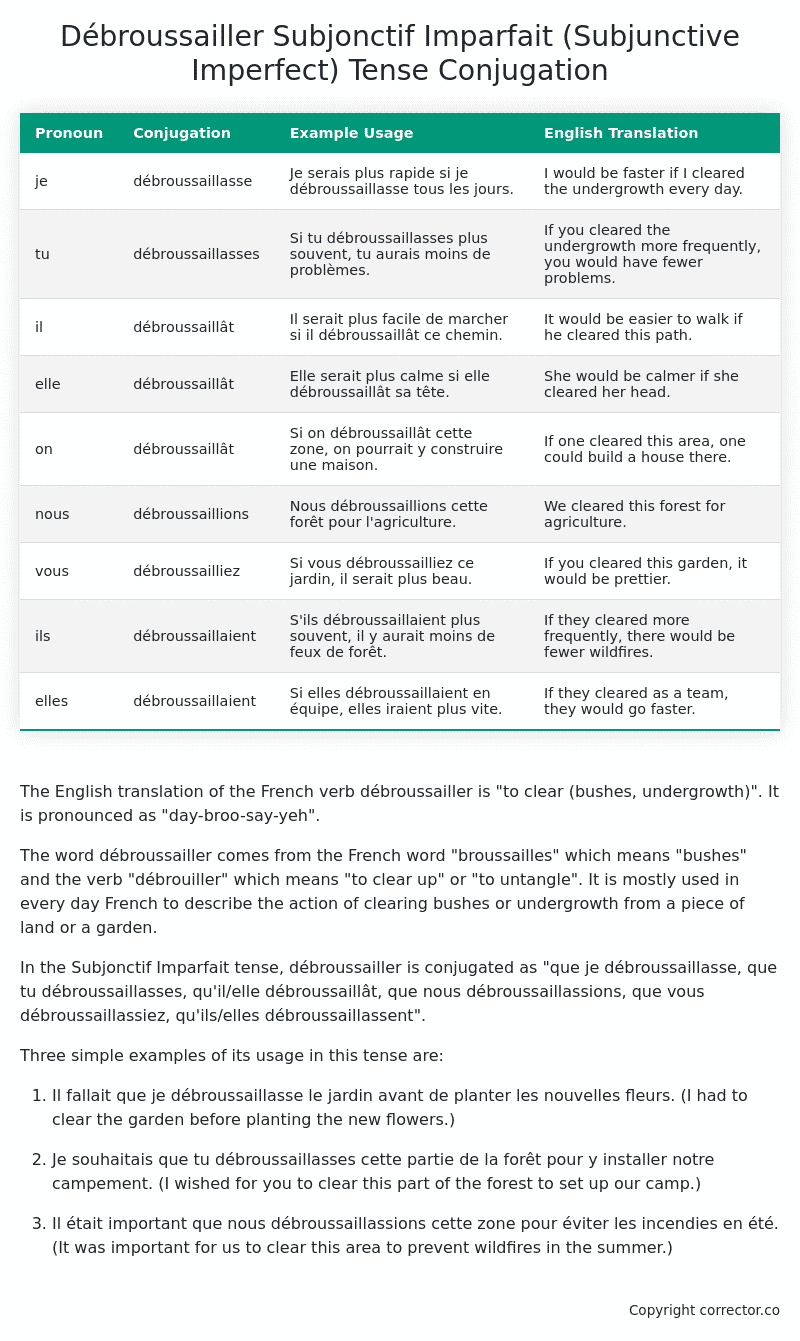Subjonctif Imparfait (Subjunctive Imperfect) Tense Conjugation of the French Verb débroussailler
Introduction to the verb débroussailler
The English translation of the French verb débroussailler is “to clear (bushes, undergrowth)”. It is pronounced as “day-broo-say-yeh”.
The word débroussailler comes from the French word “broussailles” which means “bushes” and the verb “débrouiller” which means “to clear up” or “to untangle”. It is mostly used in every day French to describe the action of clearing bushes or undergrowth from a piece of land or a garden.
In the Subjonctif Imparfait tense, débroussailler is conjugated as “que je débroussaillasse, que tu débroussaillasses, qu’il/elle débroussaillât, que nous débroussaillassions, que vous débroussaillassiez, qu’ils/elles débroussaillassent”.
Three simple examples of its usage in this tense are:
-
Il fallait que je débroussaillasse le jardin avant de planter les nouvelles fleurs. (I had to clear the garden before planting the new flowers.)
-
Je souhaitais que tu débroussaillasses cette partie de la forêt pour y installer notre campement. (I wished for you to clear this part of the forest to set up our camp.)
-
Il était important que nous débroussaillassions cette zone pour éviter les incendies en été. (It was important for us to clear this area to prevent wildfires in the summer.)
Table of the Subjonctif Imparfait (Subjunctive Imperfect) Tense Conjugation of débroussailler
| Pronoun | Conjugation | Example Usage | English Translation |
|---|---|---|---|
| je | débroussaillasse | Je serais plus rapide si je débroussaillasse tous les jours. | I would be faster if I cleared the undergrowth every day. |
| tu | débroussaillasses | Si tu débroussaillasses plus souvent, tu aurais moins de problèmes. | If you cleared the undergrowth more frequently, you would have fewer problems. |
| il | débroussaillât | Il serait plus facile de marcher si il débroussaillât ce chemin. | It would be easier to walk if he cleared this path. |
| elle | débroussaillât | Elle serait plus calme si elle débroussaillât sa tête. | She would be calmer if she cleared her head. |
| on | débroussaillât | Si on débroussaillât cette zone, on pourrait y construire une maison. | If one cleared this area, one could build a house there. |
| nous | débroussaillions | Nous débroussaillions cette forêt pour l’agriculture. | We cleared this forest for agriculture. |
| vous | débroussailliez | Si vous débroussailliez ce jardin, il serait plus beau. | If you cleared this garden, it would be prettier. |
| ils | débroussaillaient | S’ils débroussaillaient plus souvent, il y aurait moins de feux de forêt. | If they cleared more frequently, there would be fewer wildfires. |
| elles | débroussaillaient | Si elles débroussaillaient en équipe, elles iraient plus vite. | If they cleared as a team, they would go faster. |
Other Conjugations for Débroussailler.
Le Present (Present Tense) Conjugation of the French Verb débroussailler
Imparfait (Imperfect) Tense Conjugation of the French Verb débroussailler
Passé Simple (Simple Past) Tense Conjugation of the French Verb débroussailler
Passé Composé (Present Perfect) Tense Conjugation of the French Verb débroussailler
Futur Simple (Simple Future) Tense Conjugation of the French Verb débroussailler
Futur Proche (Near Future) Tense Conjugation of the French Verb débroussailler
Plus-que-parfait (Pluperfect) Tense Conjugation of the French Verb débroussailler
Passé Antérieur (Past Anterior) Tense Conjugation of the French Verb débroussailler
Futur Antérieur (Future Anterior) Tense Conjugation of the French Verb débroussailler
Subjonctif Présent (Subjunctive Present) Tense Conjugation of the French Verb débroussailler
Subjonctif Passé (Subjunctive Past) Tense Conjugation of the French Verb débroussailler
Subjonctif Imparfait (Subjunctive Imperfect) Tense Conjugation of the French Verb débroussailler (this article)
Conditionnel Présent (Conditional Present) Tense Conjugation of the French Verb débroussailler
Conditionnel Passé (Conditional Past) Tense Conjugation of the French Verb débroussailler
L’impératif Présent (Imperative Present) Tense Conjugation of the French Verb débroussailler
L’infinitif Présent (Infinitive Present) Tense Conjugation of the French Verb débroussailler
Struggling with French verbs or the language in general? Why not use our free French Grammar Checker – no registration required!
Get a FREE Download Study Sheet of this Conjugation 🔥
Simply right click the image below, click “save image” and get your free reference for the débroussailler Subjonctif Imparfait tense conjugation!

Débroussailler – About the French Subjonctif Imparfait (Subjunctive Imperfect) Tense
Formation
Common Everyday Usage Patterns
Interactions with Other Tenses
Subjonctif Présent
Indicatif Passé Composé
Conditional
Conditional Perfect
Summary
I hope you enjoyed this article on the verb débroussailler. Still in a learning mood? Check out another TOTALLY random French verb conjugation!


